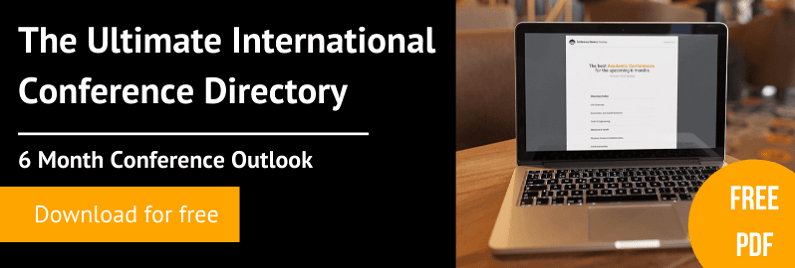
How to Get Accepted to a Academic Conference
Read a summary using the INOMICS AI tool
Everyone knows that it's important for your research and for your career to attend conferences and to present your work. Presenting at a conference lets other people in the field comment on your work to improve it, and also gives you a career boost. But how can you get your work accepted to a conference? Here are some tips on applying to conferences to give you the best chance of success.
Download the Conference Monkey Directory - 6 Month Conference List
Pick the right conference for your personality and your research
The best way to get your work accepted is to target it to an appropriate conference. Conferences can be large or small, very specialist or more broad, and based on a single subject or more interdisciplinary. Which conference will suit you best depends on a number of factors, including your personality and the subject of your research. In terms of personal factors, some people are more comfortable in a smaller conference with between fifty and a hundred attendees, where can you get to know everyone there reasonably well. Other people who are more outgoing and like to be in a busy, bustling environment might get more from a very large conference with thousands of presentations on a big range of topics. In terms of your research, think about whether your work would be interesting to and informed by a wide range of subjects and fields, in which case you would want to attend a broad interdisciplinary conference, or whether it is more niche and would fit best at a specialist conference.
Another factor in picking your conference is whether it is local or international. Big international conferences usually have the best reputations, and so presenting at them is more highly regarded. But it can be easier to get your work accepted to a smaller national conference, and you might be more comfortable presenting at a lower-pressure event if this is your first time. Also, you need to think about funding – how will you pay for your travel and accommodation costs? Find out what budget is available to you from your university, as you might find that you can get funding to attend a cheaper national conference but not an expensive international conference.
Look out for a Call for Abstracts
To know when conferences are going to be held, keep an eye on websites and email newsletters. When a conference is ready to accept applications for presentations, they will put out a “Call for Abstracts” in which they invite researchers to submit a brief summary of the work they would like to present. A Call for Abstracts usually includes information on the themes of the conference, and what topics they are especially interested in. If you can find a way to make your work fit into one of the conference themes, you will improve your chances of your abstract being accepted.
Tips on submitting your abstract
If you've identified the conference which is right for you and they've put out their Call for Abstracts, then you just need to write an abstract of a few hundred words describing what work you can present. Remember that an abstract proposing to present experimental results is usually more likely to be accepted than one presenting theoretical work. Even if your experiment isn't complete or your data analysis isn't finalised, you can still present preliminary results of what you have so far. Also remember that research which is innovative, new, or unusual is more likely to be accepted than work which is a re-tread of well-known research in your field.
When you submit an abstract for consideration, you'll probably be given the option to apply for either a talk or a poster presentation, or both. Talks are generally considered to be more prestigious than poster presentations, so it's worth applying to give a talk even if you feel nervous about the prospect. The usual strategy is to indicate that you would like to apply for both a talk and a poster presentation, and hope that you get lucky and land a talk.
Download the Conference Monkey Directory - 6 Month Conference List
Top Blog Posts to Read:
What's the difference between a conference, a seminar, a workshop and a symposium?
8 Benefits of Attending Conferences
What Should Women Wear to Academic Conferences?
What Should Men Wear To Academic Conferences?
A Guide to Asking Good Questions at Conferences
How To Improve Your Public Speaking
-
- Workshop, Conference
- (Hybrid)
- Posted 3 days ago
GLOBAFA Conference 2026 - Madrid
Between 29 May and 30 May -
- Workshop
- Posted 3 months ago
CESifo Junior Workshop on Labor Economics 2026
Between 28 May and 28 May in Munich, Germany -
- Workshop
- Posted 2 weeks ago
Geopolitical Alignment, Tensions, and the Global Economy (Measurement and Evidence)
Between 4 Dec and 4 Dec in Nanterre, France










